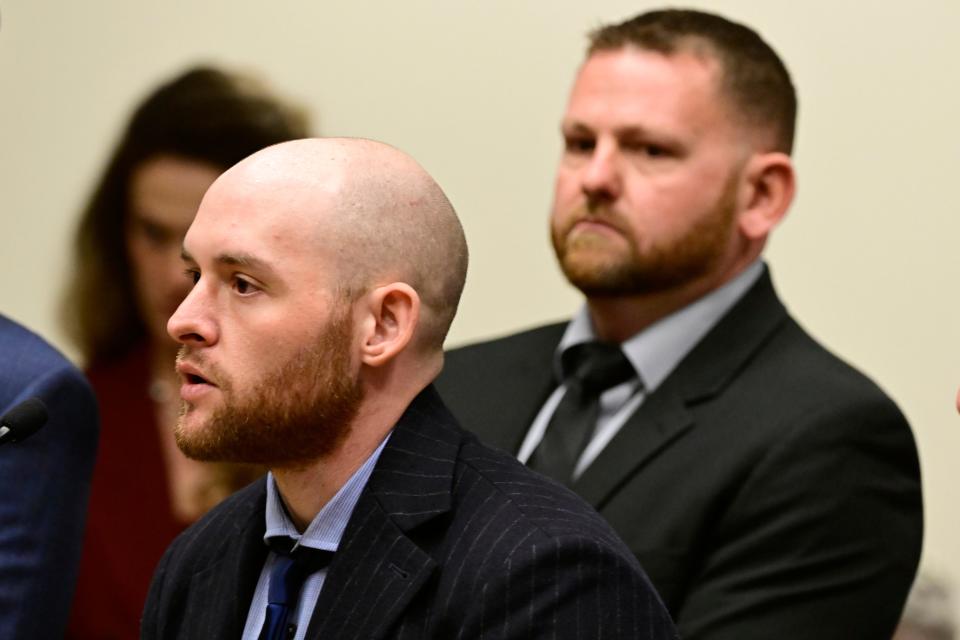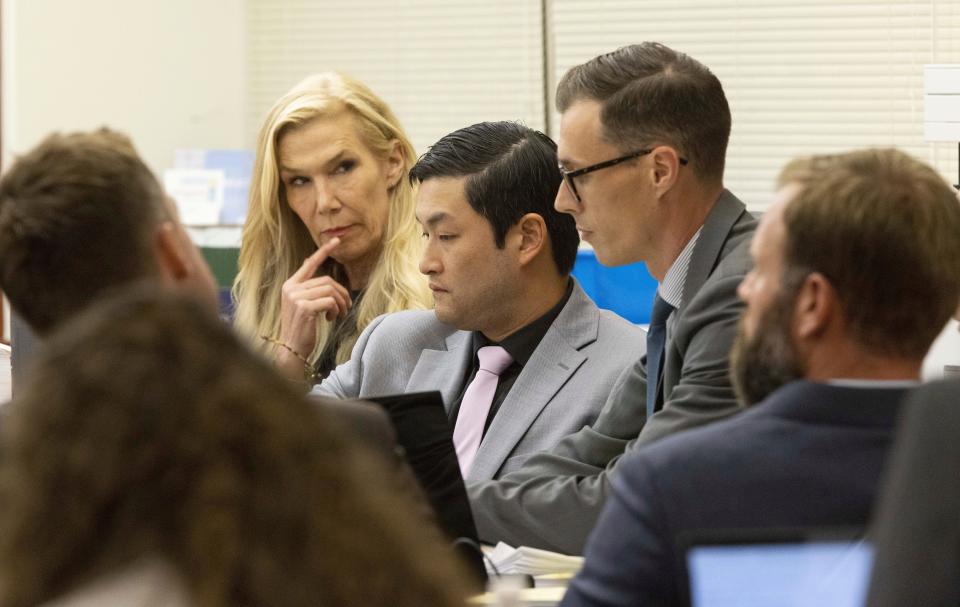Cops are on trial in two high-profile cases. Is it easier to prosecute police now?
Closing arguments are expected to begin Tuesday in the trial of one current and one former Aurora, Colorado, police officer charged in the death of 23-year-old massage therapist Elijah McClain in 2019. The officers have pleaded not guilty to criminally negligent homicide, manslaughter and assault.
In Washington, jurors in the trial of three Tacoma Police Department officers are expected to hear more testimony in the case of 33-year-old Manuel Ellis, who died in 2020 after telling officers multiple times he couldn't breathe during a struggle that was captured on camera. The officers face second-degree murder or first-degree manslaughter charges and have pleaded not guilty.
Meanwhile, in Tennessee, five former Memphis police officers charged in the beating and death of 29-year-old Tyre Nichols in January are waiting to learn when they will stand trial in state court. The officers have pleaded not guilty to second-degree murder and other charges in the case.
Across the United States, the number of police officers charged with violent on-duty crimes, including murder, manslaughter and assault, has increased in recent years in part because of increased public scrutiny, new technology and legal changes that have helped make prosecutions possible. Still, such charges for police officers remain rare and convictions are rarer still, data shows.
"There's a demand for criminal prosecution," said Kate Levine, a professor at the Benjamin N. Cardozo School of Law in New York. "And so prosecutors are looking to charge police officers when they wouldn't have in the past, and/or because of police bodycams or citizens taking videos, evidence comes up to contradict these claims, where it may not have in the past."

Are more police officers being charged with murder?
Police kill more than 1,000 people each year, according to databases created by the Washington Post and civil rights organization Campaign Zero.
Since 2005, 185 nonfederal law enforcement officers have been arrested on charges of murder or manslaughter as a result of an on-duty shooting, according to Philip Matthew Stinson, a professor of criminal justice at Bowling Green State University in Ohio who tracks the criminal arrests of nonfederal police officers.
Stinson's data shows the number of officers charged in on-duty fatal shootings has generally increased, from a low of one in 2011 to a high of 21 in 2021. But Stinson said he doesn't consider that a remarkable shift in part because the number of police killings has also increased in recent years.
According to The Washington Post, fatal police shootings increased from 995 in 2015 to a record high of 1,096 in 2022. The Mapping Police Violence database created by Campaign Zero found police killed a record-high 1,250 people last year, up from 1,099 in 2017.
"The number of officers charged in terms of a percentage has stayed flat, it's still under 2% of the cases ... so from where I sit things have not changed," Stinson said.
Since 2005, 59 officers charged with murder or manslaughter in connection with an on-duty shooting have been convicted of a crime, but only six were convicted of murder, according to Stinson's data. The criminal cases of 45 officers arrested on charges of murder or manslaughter after an on-duty shooting are pending.
The data doesn't reflect officers charged in non-shooting deaths, such as in the deaths of McClain, Ellis, Nichols or George Floyd, who was murdered in Minneapolis in 2020.

What has changed, according to Stinson, is the number of officers arrested for other violent crimes, such as assault. He said the most recent data he has analyzed, which has not yet been peer-reviewed, shows that from 2014 to 2018, there was a significant increase in officers arrested in connection with other on-duty violent crimes.
Stinson said that spike could be the result of an increase in cameras, including cellphone, doorbell and body-worn cameras, as well as increased scrutiny of police use of force sparked by the 2014 killings of Tamir Rice in Ohio and Michael Brown in Missouri, which helped fuel the Black Lives Matter movement.
"Their on-duty violence is being more closely scrutinized by prosecutors and their own agencies," Stinson said.
Is it getting easier to prosecute police officers?
In most cases, on-duty fatal shootings are determined to be legally justified.
On Friday, for example, officials in Georgia announced the state troopers who shot a 26-year-old environmental activist who was protesting the construction of a police and fire training center near Atlanta will not face criminal charges because their use of deadly force was "objectively reasonable."
In Philadelphia, former police officer Mark Dial was initially charged with murder, voluntary manslaughter, aggravated assault, simple assault, reckless endangering of another person, and official oppression in connection with the shooting of 27-year-old Eddie Irizarry on Aug. 14. But last month, a judge agreed with the defense's argument that Dial acted in self-defense and dismissed the charges.
When cases do make it to trial, Stinson said, juries are still "very reluctant to second-guess the split-second decisions of on-duty police officers in potentially violent street encounters."
But as public scrutiny has increased, some states have made changes to laws surrounding the use of deadly force by police.
In 2018, voters in Washington approved Initiative 940, which removed the requirement that prosecutors prove an officer acted with malice before murder charges can be filed − something no other state required. Ellis' case marked the first time the state's attorney general's office criminally charged police officers with the unlawful use of deadly force and the second time an officer has been charged in a homicide in Washington since the change took effect.
"What 940 established doesn't make it easy − I think it's really important to say that − but it establishes the possibility of holding police criminally accountable for negligent behavior," said Martina Morris, a member of the Washington Coalition for Police Accountability.
Seven states also have changed laws governing when police are justified in using deadly force, according to Everytown for Gun Safety. When California in 2019 changed the standard for which a police officer can use deadly force from when it’s “reasonable’’ to when it’s “necessary," Robert Weisberg, law professor and faculty co-director of the Criminal Justice Center at Stanford University in California, told USA TODAY the change moved "the law in the direction of making it more feasible to prosecute officers for homicide."
Abdul Nasser Rad, managing director of research and data at Campaign Zero, said it's still unclear what the impact of those changes has been.
"The jury's still out on that," he said.
Because it can take years for internal investigations and subsequent criminal cases to be resolved, it's difficult to determine whether it's getting easier to prosecute police officers, Rad said.
"I don't think it's fair to say whether it's gotten worse or better. It's such a small number, and there's so many missing values."
Contributing: Jorge L. Ortiz and Thao Nguyen, USA TODAY; The Associated Press
This article originally appeared on USA TODAY: Is it easier to prosecute police killings? Why not much has changed

